
CANADIAN JOURNAL OF CARDIOLOGY
Scope & Guideline
Pioneering Research in Cardiology and Cardiovascular Medicine
Introduction
Aims and Scopes
- Clinical Cardiology:
The journal regularly publishes research related to clinical cardiology, including studies on heart failure, arrhythmias, coronary artery disease, and valvular heart disease. This focus is critical for understanding and improving patient outcomes. - Interventional Cardiology:
There is a significant emphasis on interventional techniques such as percutaneous coronary interventions, transcatheter aortic valve replacements, and catheter-based treatments. This area highlights advancements and procedural outcomes. - Preventive Cardiology:
Research on preventive measures, including lifestyle interventions, risk factor management, and public health initiatives aimed at reducing cardiovascular disease incidence, is a core focus. - Cardiovascular Imaging:
The journal features studies on various imaging modalities including echocardiography, cardiac magnetic resonance, and computed tomography, which are essential for diagnosis and management in cardiology. - Genetics and Cardiovascular Disease:
Recent publications have explored the genetic underpinnings of cardiovascular conditions, emphasizing the role of genetic research in understanding disease mechanisms and patient management. - Socioeconomic and Equity Considerations:
There is an increasing focus on the intersection of cardiovascular health with social determinants, addressing disparities in care and outcomes among different populations. - Emerging Technologies:
The journal highlights the use of artificial intelligence, telemedicine, and digital health solutions in cardiology, reflecting the evolving landscape of healthcare technology.
Trending and Emerging
- Atrial Fibrillation and Rhythm Management:
There has been a marked increase in studies addressing atrial fibrillation, including its management, ablation techniques, and the impact of lifestyle factors on outcomes, indicating a growing recognition of its prevalence and complexity. - Frailty and Cardiovascular Health:
Research focusing on frailty, particularly in older populations and its relationship with cardiovascular health, has gained traction, highlighting the importance of comprehensive geriatric assessments in cardiac care. - Telehealth and Remote Monitoring:
The rise of telehealth solutions and remote patient monitoring technologies has been accelerated by the COVID-19 pandemic, with an increasing number of studies focusing on their effectiveness and implementation. - Social Determinants of Health:
There is an emerging emphasis on understanding how social determinants and health equity impact cardiovascular outcomes, which reflects a broader recognition of the importance of context in health care. - Artificial Intelligence in Cardiology:
The integration of artificial intelligence in diagnostics, treatment planning, and risk assessment is a rapidly developing area, with numerous studies exploring its applications and implications for clinical practice. - Patient-Centered Care Approaches:
The journal has begun to feature more research focused on patient-reported outcomes, shared decision-making, and personalized treatment strategies, reflecting a shift towards more holistic patient care.
Declining or Waning
- Traditional Pharmacological Interventions:
There appears to be a waning focus on traditional pharmacological approaches in cardiology, as recent trends favor discussions around innovative therapies and personalized medicine. - General Cardiovascular Physiology:
Research that broadly addresses cardiovascular physiology without specific clinical or interventional applications seems to be less frequent, potentially overshadowed by more targeted studies. - Basic Science Research:
Although fundamental science remains important, there has been a noticeable shift towards translational and clinical research, with less emphasis on purely experimental studies. - Single-Center Studies:
The journal increasingly favors multi-center trials and larger cohort studies, which provide more generalizable results, leading to a decrease in the publication of single-center research. - Classic Epidemiological Studies:
While epidemiological research is still relevant, there is a trend towards more complex models and analyses using big data, which may be reducing the emphasis on traditional epidemiological approaches.
Similar Journals
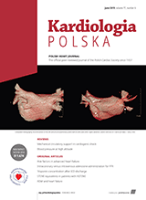
Kardiologia Polska
Bridging Knowledge and Practice in CardiologyKardiologia Polska, the esteemed journal of the Polish Cardiac Society, has established itself as a vital resource in the field of cardiology and cardiovascular medicine since its inception in 1954. With an ISSN of 0022-9032 and an E-ISSN of 1897-4279, this journal serves as a platform for groundbreaking research and scholarly articles that contribute to the advancement of heart health. Although currently not an open access journal, it remains an essential reference for practitioners and researchers seeking to stay abreast of the latest developments in cardiovascular science. The journal reflects its scholarly depth through a Category Quartile of Q3 and a commendable Scopus ranking at the 48th percentile in its field. Published primarily in Poland, it caters to a global audience eager to explore comprehensive studies spanning clinical cardiology, innovative therapeutic approaches, and emerging cardiovascular trends. Join a thriving academic community by engaging with the invaluable insights and research contributions found within the pages of Kardiologia Polska.

Journal fur Kardiologie
Transforming Cardiology Through Rigorous Research.The Journal fur Kardiologie, published by KRAUSE & PACHERNEGG GMBH, is a pivotal resource in the field of Cardiology and Cardiovascular Medicine. With an ISSN of 1024-0098 and an E-ISSN of 1680-936X, this journal has played a significant role in disseminating valuable research and clinical studies from 1998 until its coverage discontinuation in Scopus in 2017. Despite its Scopus rank being relatively low at #316/324 in its category, it continues to serve as a platform for emerging cardiology research. The journal’s scope encompasses various aspects of cardiovascular health, providing insights that are crucial for researchers, professionals, and students alike seeking to advance their knowledge and practice in cardiology. While the journal is not open access, its contributions to the field are essential for those looking to stay informed about the latest developments in cardiovascular medicine.

CURRENT CARDIOLOGY REVIEWS
Advancing Cardiovascular Knowledge for Better OutcomesCURRENT CARDIOLOGY REVIEWS, an esteemed journal published by BENTHAM SCIENCE PUBL LTD, is a pivotal resource in the field of cardiology and cardiovascular medicine. With an ISSN of 1573-403X and E-ISSN of 1875-6557, this journal presents comprehensive reviews that contribute significantly to the advancement of scientific knowledge and clinical practices in cardiology. Operating with open access options, CURRENT CARDIOLOGY REVIEWS is dedicated to bridging the gap between research and practice, thereby encouraging interdisciplinary collaboration and knowledge sharing. The journal has been instrumental in disseminating high-impact findings, consistently maintaining a Q2 category ranking in both Cardiology and Cardiovascular Medicine, as well as within the miscellaneous categories of Medicine, highlighting its relevance and respect in the academic community. Researchers, practitioners, and students alike will find valuable insights into contemporary cardiovascular issues, practices, and innovations that promote better patient outcomes. Based in the United Arab Emirates, CURRENT CARDIOLOGY REVIEWS encourages global contributions and reflects the latest advancements up to the year 2024, solidifying its role as an essential publication for those engaged in the quest for excellence in cardiovascular health.

Cardiology Journal
Unleashing insights for better heart health.Cardiology Journal, published by VIA MEDICA, stands as a prominent resource in the field of cardiology and cardiovascular medicine, with an ISSN of 1897-5593 and an E-ISSN of 1898-018X. Recognized for its Open Access model established since 1994, this journal facilitates widespread dissemination of critical research findings, allowing practitioners and researchers globally to access valuable insights without barriers. Based in Poland, with an address at UL SWIETOKRZYSKA 73, 80-180 GDANSK, it has achieved a respectable Q2 classification in 2023 for both Cardiology and Miscellaneous Medicine categories, reflecting its influence and quality within the scholarly community. With a Scopus ranking placing it at #117 out of 387 in Cardiology, it lies within the 69th percentile, underpinning its commitment to advancing knowledge in cardiovascular health. The journal’s converged years extending from 2006 to 2024 ensure it captures ongoing developments in a rapidly evolving field. As such, the Cardiology Journal serves as an indispensable platform for researchers, professionals, and students dedicated to exploring the frontiers of cardiac science and improving patient care.
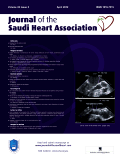
Journal of the Saudi Heart Association
Pioneering Insights in Cardiovascular Medicine Since 2009The Journal of the Saudi Heart Association is a prominent scholarly publication dedicated to advancing knowledge in the fields of cardiology and cardiovascular medicine. Published by DIGITAL COMMONS BEPRESS, this open-access journal has been serving the global community since 2009, providing a vital platform for researchers, practitioners, and students interested in the latest developments in heart health and disease management. With an ISSN of 1016-7315 and a growing repository of knowledge alongside an E-ISSN of 2212-5043, the journal showcases an array of peer-reviewed articles that contribute to the understanding of cardiovascular conditions. Although categorized in the Q4 quartile for 2023, it remains committed to offering valuable insights, particularly within the constraints of the 29th percentile rank specified by Scopus. As the journal converges towards 2024, it continues to foster collaboration, innovation, and inquiry within the Saudi Arabian and international medical communities.

REVISTA ESPANOLA DE CARDIOLOGIA
Exploring the Frontiers of Heart HealthREVISTA ESPANOLA DE CARDIOLOGIA is a premier journal dedicated to the dynamic field of cardiology, published by EDICIONES DOYMA S A in Barcelona, Spain. With an impressive Q1 status in the Medicine (miscellaneous) category for 2023, this journal is recognized for its significant contributions to cardiovascular research, evidenced by its rank of #61 out of 387 in the Scopus database, placing it within the top 16% of journals in its field. Covering a broad range of topics within cardiology, the journal aims to disseminate high-quality research, clinical studies, and educational content, fostering knowledge sharing among researchers, clinicians, and students alike. While it does not currently offer open access, the journal maintains a commitment to advancing cardiovascular health through rigorous peer-reviewed articles. With a publication history that spans from 2013 to 2024, REVISTA ESPANOLA DE CARDIOLOGIA is an essential resource for those seeking to stay at the forefront of cardiology advancements and practices.
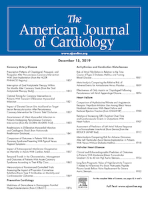
AMERICAN JOURNAL OF CARDIOLOGY
Driving Innovation in Heart Health and Clinical OutcomesThe American Journal of Cardiology is a leading peer-reviewed journal in the field of Cardiology and Cardiovascular Medicine, published by Excerpta Medica Inc-Elsevier Science Inc. Since its inception in 1958, the journal has consistently contributed to the advancement of cardiovascular research, providing a platform for groundbreaking studies and clinical findings that shape modern medical practices. With an impressive impact factor placing it in the Q1 category in its field for 2023, it ranks among the top journals in medicine, with a rank of #155 out of 387 in the Scopus database, reflecting its significance and rigorous editorial standards. The journal is committed to disseminating high-quality research that fosters innovation and enhances clinical outcomes in cardiology. Although it does not provide Open Access options, the American Journal of Cardiology remains an essential resource for researchers, healthcare professionals, and students looking to deepen their understanding of cardiovascular health.
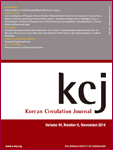
Korean Circulation Journal
Connecting Researchers and Practitioners for Heart Health Advancements.Korean Circulation Journal, published by the Korean Society of Cardiology, has established itself as a prominent platform for disseminating research in the fields of Cardiology and Cardiovascular Medicine. With an ISSN of 1738-5520 and an E-ISSN of 1738-5555, this journal has been at the forefront of cardiovascular science since its inception in 2006 and is projected to continue until 2024. The journal's commitment to quality is reflected in its 2023 category quartiles, ranking in the second quartile (Q2) for both Cardiology and Internal Medicine, as well as its commendable Scopus rankings within the respective fields. Located in South Korea, the journal aims to bridge the gap between cutting-edge research and practical applications, serving as an invaluable resource for researchers, healthcare professionals, and students keen on advancing their understanding of cardiovascular health. Although currently not an open-access journal, it provides a wealth of knowledge that encourages evidence-based practice in clinical settings.
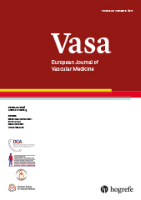
Vasa-European Journal of Vascular Medicine
Championing High-Quality Research in Cardiovascular CareVasa - European Journal of Vascular Medicine is a leading peer-reviewed journal dedicated to advancing the field of vascular medicine, published by HOGREFE AG in Switzerland. With a proud history dating back to 1972, this journal serves as a critical platform for researchers, clinicians, and healthcare professionals committed to enhancing knowledge and practice related to cardiovascular health and vascular disorders. Holding a notable Q2 ranking in the cardiology and cardiovascular medicine category, Vasa’s scholarly contributions reflect high-quality research and innovative insights that drive clinical applications. The journal provides essential access to original articles, reviews, and case studies, fostering a vibrant exchange of ideas within the vascular medicine community. Its Scopus rank of #159 out of 387 further underscores its impact, placing it confidently in the 59th percentile among its peers. Vasa is synonymous with rigorous academic standards and relevance, making it an invaluable resource for anyone seeking to stay at the forefront of vascular research and its clinical implications.
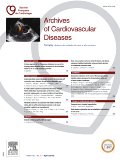
Archives of Cardiovascular Diseases
Pioneering research and collaboration in cardiology.The Archives of Cardiovascular Diseases, published by Elsevier Masson, stands as a leading journal in the field of cardiology and cardiovascular medicine, with an impressive impact factor that underscores its relevance and influence. This esteemed journal, recognized in the Q2 category for both cardiology and miscellaneous medicine, aims to disseminate groundbreaking research, innovative methodologies, and clinical advancements that can shape the future of cardiovascular health. With its diverse array of open access options, researchers and students alike have the ability to engage with high-quality content, ensuring that cutting-edge findings are accessible globally. Since its inception in 2008, the journal has actively contributed to the advancement of knowledge in cardiovascular diseases, fostering collaboration among clinicians, researchers, and educators. Headquartered in Paris, France, Archives of Cardiovascular Diseases remains committed to enhancing our understanding of cardiovascular health and improving patient outcomes worldwide.